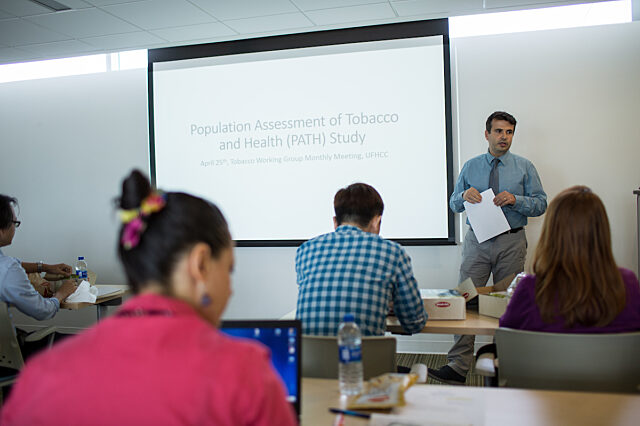UF Health researchers find medication most effective quitting method for cancer survivors who smoke

For years, evidence has shown the negative effects that smoking cigarettes has on cancer patients’ health outcomes, but sometimes quitting is easier said than done. Now University of Florida researchers have found that medications that help people quit smoking are the most effective method used by cancer survivors to stop tobacco use.
Using data from a year-long national survey of smokers in the United States conducted by the National Institutes of Health and the U.S. Food and Drug Administration, the researchers focused on the cessation methods used by 565 adult cancer survivors who were past-year smokers and the success of those methods.
“To our knowledge, this is the first population-based study that's looking at a sample that represents the entire U.S. population instead of a single location and is outside of controlled environments, like a clinical trial,” said Ramzi Salloum, Ph.D., lead author and an assistant professor in the UF College of Medicine’s department of health outcomes and biomedical informatics. “This is real-world information about cancer survivors who smoke and their attempts to quit smoking.”
The researchers found that medications that help people quit smoking — also called smoking cessation medications — were effective in cancer survivors’ attempts to quit smoking when used alone and in combination with other methods, such as behavioral therapy, unassisted attempts and e-cigarettes. Using these medications, which are recommended by the FDA and by clinical practice guidelines for smoking cessation, 28.5% of the smokers successfully quit smoking.
“This is important because the step of offering smoking cessation medication may be overlooked during the course of a patient’s overall cancer treatment,” said Salloum, also a UF Health Cancer Center member. “This study highlights the importance of including smoking cessation medication as a part of the treatment for cancer patients who smoke.”
The study also highlights the importance of quitting smoking after receiving a cancer diagnosis, Salloum said. Some patients may think it is too late to quit smoking after already being diagnosed with cancer, but cessation has been proven to have health and financial benefits for these patients, such as increased treatment effectiveness, reduced risk of cancer recurrence and lower treatment costs.
“The period around a cancer diagnosis may be a stressful time for a cancer patient,” Salloum said. “The decision to quit smoking is something that patients actually can have control over, whereas they may feel that they have less control over other aspects of their life.”
Currently, the National Cancer Institute is leading an initiative to support implementation of smoking cessation programs at cancer centers across the country, because although oncologists recognize the importance of cancer patients quitting smoking, tobacco cessation has not been consistently addressed as a part of routine oncology practice.
“This study could inform that initiative in terms of highlighting the importance of medication use,” Salloum said. “Cessation medications are potentially lower cost and may be easier to implement compared with other cessation methods.”
Smoking cessation is more crucial than ever for cancer patients who are now facing the added risk of the novel coronavirus, COVID-19. While the exact impact of COVID-19 on smokers and cancer patients who smoke is still being studied, it is known that COVID-19 is a respiratory disease and smoking is particularly harmful to the respiratory system.
“Smoking cessation can only benefit patients when it comes to the potential threat of COVID-19,” Salloum said. “It's definitely an opportune time to consider smoking cessation if a cancer patient is currently smoking.”
The study, “Smoking-Cessation Methods and Outcomes Among Cancer Survivors,” was published online in May by the American Journal of Preventive Medicine. It was co-authored by fellow UF Health Cancer Center members Ji-Hyun Lee, Dr.PH., and Chengguo Xing, Ph.D., and was funded in part by the Cancer Center.
About the author
